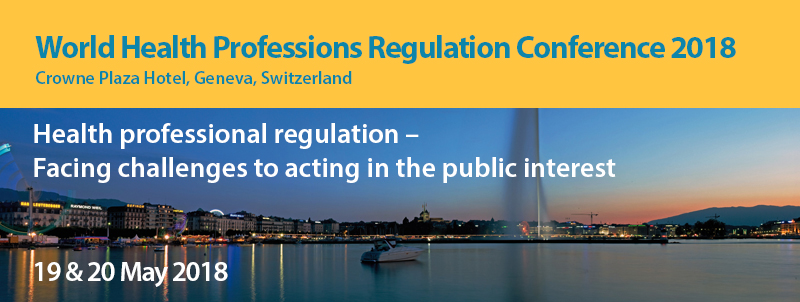
The preliminary programme of the 6th World Health Professions Regulation Conference (WHPRC) has been announced! Make sure you don’t miss out.
Health professional regulation faces many challenges in a world characterised by political, social, economic and technological change. Widespread reform of health professional regulation reflects policy initiatives by many governments to ensure sustainable, efficient and effective health service delivery. But what are the implications of these challenges, and how do we ensure the public’s best interests are met?
Scheduled to run over one-and-a-half days immediately before the World Health Assembly, on 19-20 May 2018, the WHPRC will provide participants with insights, perspectives and discussion on current challenges in health professional regulation.
Keynotes, panel discussions and Q&As will make sure there is sufficient interaction among speakers and the audience. Key speakers will explore the lessons learnt from competence-based approaches to regulation, compare regulatory models and examine ways of promoting best practices in regulatory governance and performance. They will come from all disciplines in health care and governments, and will reflect the different systems around the globe.
What’s happening, What’s it all about?
The programme is structured around three main themes that will be addressed during the conference:
Session 1: A call to set the right standards in regulation!
Topics will include: setting the right standards, who is regulating the regulators, ethics and professional autonomy, barriers to implementation, and reimbursement.
Chair: Ardis Hoven, World Medical Association (WMA), USA
Keynote presentation: How do we set the right standards? How do we make standards work for the better patient care? – Zubin Austin, University of Toronto, Canada
Ethics and professional autonomy – Andrew Gray, University of KwaZulu-Natal, South Africa
Who is regulating the regulators? – David Benton, The National Council of State Boards of Nursing (NCSBN), United Kingdom/USA
Panel discussion:
• Market-driven deregulation attempts in the European Union
• Positive examples: Australian and New Zealand registration standards and their benefits & lack of impediments to migrations and mutually agreed thresholds – Margot Skinner, World Confederation for Physical Therapy (WCPT), New Zealand
Panel discussion – What are the barriers to implementation of the right standards?
• Example of a wrong incentive: the case of mercury – Andrew Wetende, FDI World Dental Federation, Kenya
• When innovative practices do exist but are not reimbursed & problems caused by hierarchy – Andrew Gray, University of KwaZulu-Natal, South Africa
• Importance of regulation to ensure evidence-based care – Barry Dolman, International Society of Dental Regulators (ISDR), Canada
Session 2: Safety, quality and compliance: benefitting patients, communities and populations
Topics will include: best practice guidelines, the role of regulation in sustainable prevention, facilitation of migration, the cost of maintaining licences, use of big data and case studies of outcome-oriented measurements.
Chair: Marc Seale, Health Professions Council of the United Kingdom, United Kingdom
Right touch regulation & best practice guidelines – Franklin Schaffer, Commission on Graduates of Foreign Nursing Schools (CGFNS) International, USA
Global professions need global regulations. How much local adaptation is needed? (Migration) – Jacques de Haller, European Doctors, Switzerland
OECD – Patient reported outcome measurements (PROMs) by OECD – OECD representative
Big data analysis to improve care and patient safety – Emmanuel Jo, Ministry of Health, New Zealand
Panel discussion:
• Market-driven deregulation attempts in the European Union
• Positive examples: Australian and New Zealand registration standards and their benefits & lack of impediments to migrations and mutually agreed thresholds – Margot Skinner, World Confederation for Physical Therapy (WCPT), New Zealand
Session 3: Supporting the quality of lifelong learning
Topics will include: continuing professional development (CPD) and a discussion on the need for global standards, fostering innovation, improving patient treatment, the shift in CPD of assessment vs independence, and regulation of specialisation.
Chair: Gerhard Seeberger, FDI World Dental Federation, Italy
What does CPD mean? Why do we need CPD and how does CPD serve the patient? Cross-border recognition of CPD; How does it foster innovation? – Mounir Doumit, FDI World Dental Federation, Lebanon
Standards for CPD: Making them contextual, global comparable and accountable – Janet Grant, Centre for Medical Education in Context (CenMEDIC), United Kingdom
Improving patient treatment; as knowledge in therapy is rapidly evolving, there is a need for a shift in CPD (assessment of CPD, independence). What is the value of a generalist? CPD for patient care or for career development? – Mike Rouse, Accreditation Council for Pharmacy Education, USA
The conference will take place on 19–20 May 2018, immediately before the World Health Organization’s World Health Assembly in Geneva. The location is the Crowne Plaza Hotel.
No comments:
Post a Comment